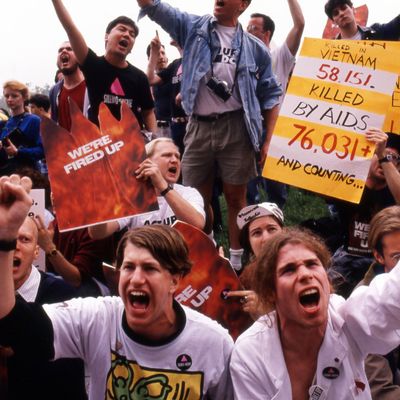
“Every relationship can be based on love, even if it lasts only 15 minutes”: That’s one of the beliefs that drove a wave of activism to reinvent America’s understanding of sex, civic responsibility, and social welfare in the 1980s, says David France. The award-winning director of AIDS-activism documentary How to Survive a Plague — and author of the book of the same name — visits New York Magazine’s Sex Lives podcast this week to reflect on the hope and heartbreak of coming of age during a sexual crisis, and to consider how his generation’s hard-won victories can inform today’s protest movement.
This is a partial transcript from New York Magazine’s Sex Lives podcast. Listen to the whole episode above; click here to subscribe.
Looking back at the AIDS activism, what seems different now? When you went back to the archival footage, and started thinking about it again in more recent decades?
One thing I should point out is that, in 1981, when the first reports of disease came, something like 60 percent, 65 percent, maybe 70 percent of Americans found gay people entirely unacceptable, and the rest were uncertain. Gay people had no traction in civic life. None at all. I mean there were no gay people on television, there were no out gay politicians. There had been one and he was assassinated — which tells us that there’s not going to be another for a period of time.
Harvey Milk?
Harvey Milk. There were no openly gay reporters in newspapers or on television stations. There were no gay people in the public eye. None, none, none. And there was no suggestion that that was ever going to happen.
Now today, we know that over half of America is opposed to what this guy [Donald Trump] is doing. We know from the polls that 70 percent of America disapproves of what he’s doing. We already have the hearts and minds, but we don’t have is the strategy, the end game. Like, how are we going to respond to this? How does one respond to it? Well, I have to admit that I went to bed, night after night, convinced that the Electoral College was going to just, you know, kick out the vote. And that’s delusional, but I had a hope!
Wishful thinking.
But sooner or later, that wishful thinking has to give way to this concrete agenda of work. And once you know, the movement develops to a point where that those ideas are congealing, and developing, and being promulgated and shared. Then, I think we have a game plan.
Why do you think that hearts-and-minds change happened so quickly?
The movement to gay marriage is very clearly tied to the AIDS epidemic. The AIDS epidemic forced the hand of the community and the movement to demand personhood. And there was an urgency to it. There was a killer out there that claimed hundreds of thousands of American lives. Hundreds of thousands of American lives. And we as a people had to do something to respond to it. The cultural advancement and integration of the queer community in American society happened over such a short period of time— literally over a 20-to-25-year period, going from outlaws to in-laws. It’s unparalleled, really, in American history. We just haven’t seen it. The hundreds of years it’s taken us to make any sort of progress on acknowledging racism and addressing racial inequalities in the country.
The Black Lives Matter movement is also about a killer out there, and yet that’s been a really tough battle.
Another similar movement, though, right? Black Lives Matter says this is not just about these institutional problems within the police force and in policing in American cities — it’s about the way America thinks about people of color, about black lives. And you have to change that entire broad culture in order to get to that pinpoint of a goal. Those parallels are really powerful.
One thought, for a period of time, that the advancements were permanent. And we see now, in the people who are gaining appointments in this administration, that at least on the question of queer stuff, that they really do see a time when, as they say, “America was great again.” A time [when] a kind of 1950s America — when a single, monolithic image of the acceptable American — existed. And [what] that entails — and it’s being spoken about very openly — things like conversion therapy, things like a rollback of political advancements for the transgender community. This executive order which Trump may or may not promulgate about so-called religious freedoms that would allow people to discriminate legally against queer people, one thought that that was gone. [Edit: Read more on the subject here.] But there it is again. So, I think, on so many social fronts, there’s going to be battles all over the place. I think we have to look back at the Reagan years in America to see what that looked like. I mean, Reagan came with a real domestic counter-revolutionary agenda. Also worked out on the international scale, but the cultural battles in America were supreme. And I think we’re going to see those all over again in this administration.
How to Survive a Plague will be screened at New York’s IFC Center on President’s Day, followed by a Q&A with David France. Questions, comments, complaints? Leave voicemail for Sex Lives at 646-494-3590.




